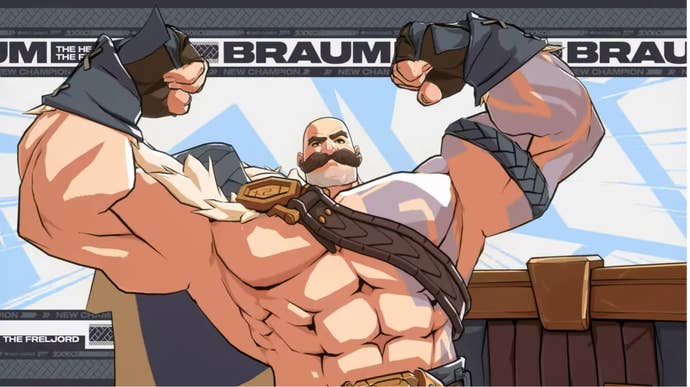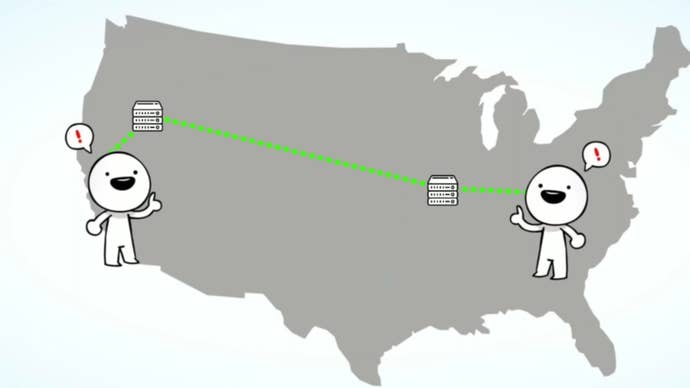Products You May Like
Evo 2024 has wrapped up, and while thousands of attendees all turned up to play and spectate their favourite fighting game, lines were long to try out the latest build of one not-yet revealed. 2XKO, Riot Games’ upcoming fighter turned up at the show in a big way, and with it came new information. But one aspect remains interesting and largely untouched: the tech behind the game and why it matters.
Who better to talk about this than Tony Cannon. Creator for GGPO rollback netcode back in 2009, Tony has been somewhat of a striking figure in the pursuit of better online play in fighting games. These days, he’s working as 2XKO’s tech lead, and was gracious enough to sit down for a 10-minute chat on the Evo show floor.
First up, for a while now the 2XKO team has been eager to share that server-based rollback will be a major component of 2XKO. But what does that actually mean, and how does it differ from regular rollback?
Tony Cannon: “The main benefit is we’re a four-player game. When you have a two-player game running peer-to-peer, you’re just exchanging back and forth. If something goes wrong, it’s no big deal – it’s like one glitch. But if you have four people, now those errors have to be communicated to three other players, and things are three times as likely to go wrong.”
“If one person drops out in a four-player game, what do the other players do? The game has to end, right? So if you put a server in the middle, then the amount of information you have to send is decreased. You can make it so if three players are having a good time and have stable connections, and the fourth player is kind of jank or drops out entirely, you can actually do something about it.”
“Especially in a duo game. If at one point you’re the assist, and your assist connection is a little shaky, it doesn’t have to affect the quality of the game right? Because the assist isn’t putting in a lot of inputs. So when we have a server in the middle, we have a lot more control.”
VG247: This sounds like it’ll be quite expensive. Is this sort of solution only possible due to Riot’s pre-existing server infrastructure?
Tony Cannon: “It is certainly more expensive. But it’s something we have to do to maintain the quality we want for an online game. We don’t want a four-player game that feels kinda janky. For us it’s just like, how did the whole live service offering come together, right? That’s the thing about being a live service game, y’know it’s free-to-play, and there are costs associated with the game. How do you recover those costs? Well, it’s skins and events or whatever it is.”
“It’s all about finding that balance, balancing it out so we’re net positive and then being able to invest into the game, and servers are just one side of the cost equation.”
VG247: Earlier today Tom (Cannon) was on stage and touched on some benefits to having server-based rollback, including anti-cheat solutions and disconnect detection. What other side benefits are there?
Tony Cannon: “We think about the server as being the authority of input in time. What that means is, suppose you’re doing your combo right? And they’ve got a lag button on their controller. Or even on Windows, if you’re in windowed mode you can grab the window and stop your game from ticking, so you’re not sending inputs for a while. People will do that to disrupt the network so that you drop your combo because of the lag.”
“But the server knows. It knows the game should be on frame 100, but instead it’s on frame 101 or 102. If it doesn’t get an input it can make a smart decision on what to do. It can do that because it’s the authority of the time as well as more.”
“If you think about a really sweaty environment, like a competitive match, y’know maybe there’s a setting that can make the server really strict about how long it waits for inputs. But if you’re in a casual lobby, if it’s you and your buddy in Discord player some matches, maybe there’s another setting that’s more permissive, that lags the game a bit rather than dropping players out because you’re buds. You have that flexibility with a server in the middle. Exactly how we use it, we’re not sure right now. We need to get the game out in front of players and see how they’re vibing and what features they want, but having that flexibility is valuable.”
During a 2XKO stream earlier in the day, Tom Cannon noted that good anti-cheat capabilities was one such benefit coming to 2XKO. This raised the question: would 2XKO be using Vanguard – Riot’s own kernel-level anti-cheat – or some other software? Tony’s answer was clear and extensive.
Tony Cannon: “Yeah, we’ll use Vanguard. A lot of the cheats we see in fighting games are either about reading inputs, reading game state, or injecting inputs. They involve modifying the game binary in some way. Vanguard is really good at that, right? It’s a kernel-level anti-cheat, so it can detect and prevent a lot of those things happening.”
VG247: There are a lot of people out there with concerns about kernel-level anti-cheats like Vanguard, many focused on their privacy. What do you say to those worries?
Tony Cannon: “Yeah, well Vanguard’s running in the kernel, right? But we’re not collecting player information, reading the title bars of apps… We’re not doing anything that would be considered sensitive by a player. We’re not collecting it, and we’re not sending it. It’s very targeted and finding cheats and preventing people from tampering with the 2XKO binary.”
“There’s potential for a company that’s installing kernel-level software to do that stuff, we recognize that’s a problem. Valve has their anti-cheat, and cheats are getting so sophisticated these days that they’re having to run in the kernel as well right? So to protect everyone’s player experience, you have to work at the kernel level. So it’s like, you have to trust Riot at some point, but we are absolutely not interested in compromising players.”
A lot of emphasis is placed on offline communities with fighting games, and while it’s safe to assume 2XKO will allow for offline play, it’s not been stated outright, nor has the extent of offline modes been touched on. All of Riot’s other games have such requirements – who knows! Tony couldn’t confirm much, but he could state outright that 2XKO will be playable offline.
Tony Cannon: “One of our tenets is let’s embrace what the community does. At events like this, there’s no way you can run games that require an online connection. The capital investment required, you’d need satellite trucks in the parking lot, and even then, it would break right? So offline is a fundamental feature that we will always support for the community.”
“So for running – knock on wood – a big event like this with 2XKO, we need to do the things that TOs need to run a successful event. I think that starts with offline, and one of the things we’re interested in doing is asking small and large organizers what we can do to make their life easier. Maybe it’s a faster way for players to configure their buttons.”
“Two Evos ago, we before we had a booth, we had a meeting behind closed doors with players and TOs and asked what they want to do, what were their ideas! We got a lot of ideas we hadn’t thought of. So we’d never make the game online only, unless the players asked us for it.”

Finally, I wanted to touch on Riot’s approach to working within the fighting game community (who knows, there may be another interview coming soon that dives more into it). Riot has been around for a while, and historically speaking, the company has been very hands-on with the competitive scenes of League of Legends and beyond.
Tony, alongside his brother, founded Evo. When worries about Riot overreach into grassroots do pop up online, a common counter-argument is that it wouldn’t be something the brothers would support. As such, I asked Tony about Riot’s intent in the space.
Tony Cannon: “I think if you look at Riot’s approach, it’s always like, how do we make it better to be a gamer. When League of Legends and the first Worlds came out, they looked at the competitive ecosystem and they went like, the people who are making big events, we think we can do a better job. Then they came in and they did it.”
“I think the fighting game community right now is the exact opposite. It’s built on the passion of the players. The people come to these events – whether they’re big tournaments or smaller locals. It’s fueled by that passion. How can you do better than that? You kind of can’t. So we’re looking to just amplify and supplement. What does Riot do in the competitive space that makes this even better. We don’t know what that is yet – we’re focused right now on getting the game out – but different genres call for different things.”
If you want to hop into the game yourself, 2XKO is entering its first public alpha test this August, which you can sign up for now.
